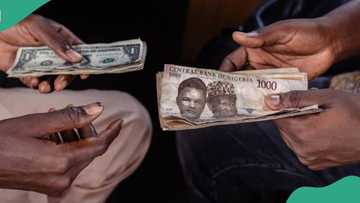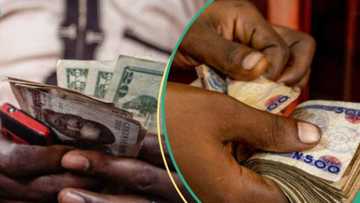GBP: Naira Nears Lowest in History as Bank of England Moves to Make Important Decision
- The British pound sterling has hit a one-year high of N2,035/£1 at parallel markets across Nigeria
- The development comes amid ongoing economic challenges and market responses to inflation data
- The pound touched its highest level in a year at $1.3044 against the dollar, and it was recently up 0.4% at $1.3017
Legit.ng journalist Zainab Iwayemi has over 3-year-experience covering the Economy, Technology, and Capital Market.
The British pound sterling reached N2,035/£1 at parallel markets across Nigeria, a one-year high, as a result of rising inflation figures and increased demand.

Source: Getty Images
The increase coincides with persistent economic difficulties and market reactions to inflation statistics.
The Consumer Price Index (CPI) indicates that inflation in the UK increased by 2%, just above economists' estimates of 1.9%.
PAY ATTENTION: Share your outstanding story with our editors! Please reach us through info@corp.legit.ng!
Traders' predictions that the Bank of England (BoE) will cut interest rates from their current 16-month high during the committee meeting next month have been reexamined as a result of the spike.
In spite of this, the Office for National Statistics reports that the inflation rate is still inside the Bank of England's goal range, which it first did in May after three years.
The pound was recently up 0.4% at $1.3017, having hit its highest level in a year when it hit $1.3044 against the dollar.
According to Daily Sun investigations, currency traders have been accumulating pounds, which has increased demand for three days running.
On Monday and Tuesday, the value of the pound sterling was N2,009/£1 and N2,016/£1, respectively. At the same time, the dollar was trading at N1,596/$1, while the euro was trading at N1,740/€1.
Since the COVID-19 pandemic sent numerous nations, including Nigeria, into recession, inflation has been a recurring problem in many economies.
The real GDP growth rate of Nigeria was lowered by the International Monetary Fund (IMF) on Tuesday, from 3.3% to 3.1%, due to the country's first quarter 2023 performance being below expectations.
Charles Abuede, a financial analyst told Legit.ng what the CBN can do to gain confidence. He said,
"I think the onus lies on the monetary and fiscal authorities to put in place friendly policies to aid the management of the fx market."
Exchange rate falls to lowest ever
Legit.ng earlier reported that in February, Nigerian naira's exchange rate worsened against the dollar and Great Britain's pound.
Findings by Legit.ng showed that the naira to pound was trading at N2,060/£1 on Monday, February 19, 2024.
This was against the N1995/£1 it closed the previous trading day, representing a 3.26% decline.
Proofreading by James Ojo Adakole, journalist and copy editor at Legit.ng.
PAY ATTENTION: Stay Informed and follow us on Google News!
Source: Legit.ng




